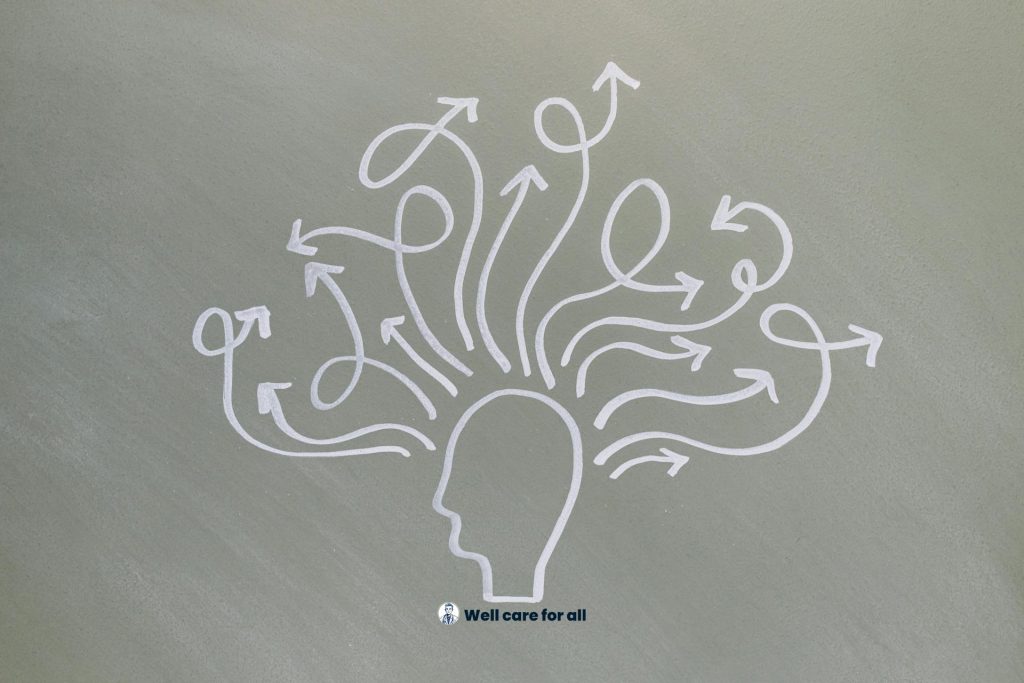
Psychotic disorders are complex and severe mental health conditions that alter an individual’s perception of reality, leading to delusions, hallucinations, and disorganized thinking. These disorders can severely affect daily life, making early diagnosis and treatment essential for better outcomes. This article examines psychotic disorders, the causes, symptoms, and treatment options that exist for these disorders.
What Are Psychotic Disorders?
Psychotic disorders are a category of severe and complicated mental health conditions characterized by detachment from reality. Individuals with these disorders experience episodes of psychosis, which involve delusions (false beliefs) and hallucinations (false perceptions, including seeing things and hearing voices that don’t exist). These symptoms can severely impact an individual’s ability to function in everyday life.
Common Types of Psychotic Disorders
- Schizophrenia – A chronic condition marked by hallucinations, delusions, disorganized speech, and cognitive impairments.
- Schizoaffective Disorder – A combination of symptoms from both mood disorders, such as mania or depression, and schizophrenia.
- Brief Psychotic Disorder – A short-term condition that lasts for a few days to a month, often triggered by extreme stress.
- Delusional Disorder – Characterized by persistent delusions without other schizophrenia symptoms.
- Substance-Induced Psychotic Disorder – Triggered by substance abuse, including alcohol, drugs, or withdrawal from these substances.
- Psychotic Disorder Due to a Medical Condition – Caused by neurological or medical conditions such as brain injuries, tumors, or infections.
Signs and Symptoms
The symptoms of psychotic disorders vary depending on the type and severity but generally include:
Primary Symptoms
- Hallucinations: Hearing voices, seeing objects, or feeling things that don’t exist.
- Delusions: Strongly held false beliefs that resist logic or contrary evidence.
- Disorganized Thinking: Difficulty organizing thoughts, leading to incoherent speech or trouble following a conversation.
- Disorganized or Abnormal Motor Behavior: Erratic movements, unpredictable agitation, or catatonia.
- Negative Symptoms: Reduced emotional expression, social withdrawal, lack of motivation, and difficulty in daily activities.
Causes and Risk Factors
The exact cause of psychotic disorders is unknown, but several factors contribute to their development.
Biological Factors
- Genetics: Experiencing psychotic disorders is more common in families with a history of psychosis.
- Brain Structure and Chemistry: Abnormalities in brain function, particularly dopamine regulation, play a significant role.
- Neurodevelopmental Issues: Brain damage or developmental abnormalities in early life may increase susceptibility.
Environmental Triggers
- Trauma and Stress: Severe stress, abuse, or significant life changes can trigger psychotic episodes.
- Substance Use: Drugs such as cannabis, LSD, and methamphetamine can induce psychosis.
- Infections or Medical Conditions: Brain infections, autoimmune diseases, or neurological disorders can contribute to psychotic symptoms.
Diagnosis and Medical Evaluation
Diagnosing psychotic disorders involves a comprehensive evaluation by a mental health professional.
Diagnostic Process
- Medical History and Physical Exam: Rule out underlying medical conditions.
- Psychiatric Assessment: Interviews to assess symptoms, behaviors, and thought patterns.
- Laboratory Tests: Blood tests or brain imaging (MRI/CT scans) to detect medical causes.
- DSM-5 Criteria: Diagnosis based on the criteria outlined in the Diagnostic and Statistical Manual of Mental Disorders (DSM-5).
Treatment Options
Although psychotic disorders are chronic conditions, with effective treatments, the symptoms of these disorders can be managed and help improve the quality of life.
Medication Therapy
- Antipsychotics: The primary treatment for psychotic symptoms, categorized into:
- Typical Antipsychotics: Older drugs (e.g., Haloperidol, Chlorpromazine) that help reduce hallucinations and delusions.
- Atypical Antipsychotics: Newer drugs (e.g., Risperidone, Olanzapine, Clozapine) with fewer side effects.
- Mood Stabilizers & Antidepressants: Used when psychotic disorders co-occur with mood disturbances.
Psychotherapy and Support
- Cognitive Behavioral Therapy (CBT): Helps patients recognize and change distorted thoughts.
- Family Therapy: Educates and involves family members in the treatment process.
- Social Skills Training: Enhances interpersonal skills to improve daily functioning.
- Support Groups: Provides a shared experience and a sense of socialization for individuals and families.
Lifestyle and Alternative Approaches
- Healthy Diet and Exercise: Supports brain function and overall well-being.
- Stress Management Techniques: Meditation, yoga, and mindfulness practices can help reduce psychotic episodes.
- Avoiding Substance Abuse: Essential in preventing relapses and worsening symptoms.
FAQs About Psychotic Disorders
Q: Can psychotic disorders be cured?
A: Psychotic disorders are typically managed rather than cured. However, with proper treatment, individuals can lead fulfilling lives with reduced symptoms.
Q: Are psychotic disorders hereditary?
A: There is a genetic component, meaning individuals with a family history of psychotic disorders have a higher risk of developing them.
Q: Can stress cause psychotic disorders?
A: While stress alone may not directly cause psychotic disorders, it can trigger symptoms in individuals predisposed to the condition.
Q: Is schizophrenia the same as psychosis?
A: No, schizophrenia is a type of psychotic disorder. Psychosis is a symptom that can appear in various conditions, including schizophrenia, mood disorders, and substance abuse.
Q: What should I do if a loved one is experiencing psychosis?
A: Encourage them to seek medical help immediately. Avoid confrontation, provide reassurance, and ensure their safety.
Conclusion
Psycho disorders are intricate mental health conditions necessitating prompt intervention and a comprehensive treatment approach. With proper medication, therapy, and lifestyle modifications, individuals can manage symptoms effectively and create the conditions to improve their quality of life. Raising awareness and reducing stigma around psychotic disorders is crucial in ensuring affected individuals receive the care and support they need. If you or someone you know is experiencing symptoms, seek professional medical help to begin recovery.



